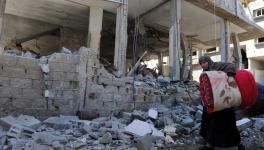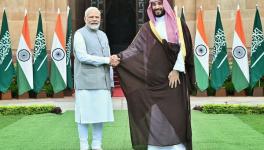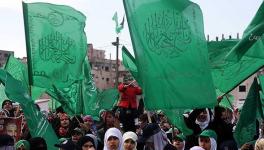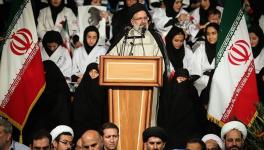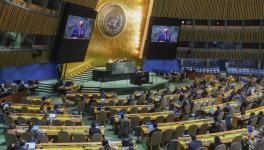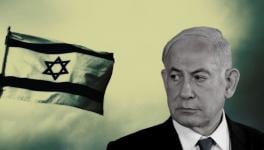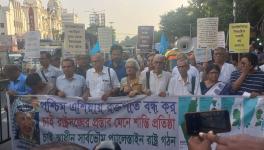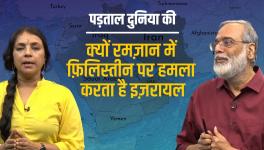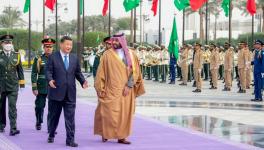A Nation of Pain and Suffering: Syria (Part 3)
Our enemies did not cross our borders
They crept through our weakness like ants.
-- Nizar Qabbani, “Footnotes to the Book of Setback”
(‘ala Daftar al-Naksah), 1967.
III. Western Plans.
On December 12, the Friends of Syria (FoS) met for their fourth conference in Marrakech, Morocco. Hilary Clinton could not go because she contracted a stomach virus. The FoS gave full political recognition to the Syrian National Coalition (SNC). They stopped short of calling it the government in exile and naming a cabinet to take charge when the Assad regime falls. Two reasons prevented this from happening: firstly, the Russians would not countenance a new government that does not have parts of the Assad regime in place; secondly, the Syrian National Coalition itself is rife with disagreements, with more secular sections nervous about the increased power of political Islam in its combine. The declaration reiterated the integrity of Syria, called for an immediate ceasefire but also recognized “the legitimate need for the Syrian people to defend themselves against the violent and brutal campaign of al-Assad regime.”
Based on her reading of western intelligence reports, Hilary Clinton had said a week ago, “It appears as though the opposition in Syria is now capable of holding ground, that they are able to bring the fight to the government forces.” The recognition of the right of the Syrian people to “defend themselves” comes somewhat late in the game. Syrians have already been in the thick of an uneven military battle since at least September 2011. Massive casualties amongst the poorly armed and untrained fighters did not deter the resistance, which remarkably continued to take on a regime that was willing to use considerable force – having already demonstrated its cruelty with the arrest and torture of children in Banyas, Daraa, Damascus, Douma, Homs, and al-Tal, including the brutal torture and murder of Hamza Ali al-Khateeb on April 29, 2011. The state security (Amn al-Dawla), the political security (Amn al-Siyasi) and the military security (Amn al-Askari) had no compunction about age or culpability; a young boy at a peaceful demonstration had to be crushed before the rebellion went into its armed phase. Such painful incidents hardened the opposition, whose resilience against the regime now seems to have turned the tide.
The US has decided to put its snout more deliberately into the process because, the New York Times notes, “it appeared the opposition fighters were beginning to gain momentum – and were becoming dominated by radical Islamists.” While the Eminencies gathered in Morocco, in Turkey the rebel commanders formed the Supreme Military Council. Reports suggest that the Qataris and the Saudis had pushed for this formation to better canalize their military assistance. Radical Islamists who have been very effective in the Syrian battlefield are unwilling to be shut out of this Council even though the recently banned al-Nusra Front was not invited.
As a sign that al-Nusra might not be as marginal as the White House hopes, senior Brotherhood leader Mohammed Farouk Tayfour said that this decision was “too hasty.” Tayfour, who is the deputy comptroller general of the Brotherhood and on the executive board of the Council, is from Hama, bombed to oblivion in 1982 by the senior Assad, but not after Tayfour’s Combatant Vanguard (Attali'a el-Moukatillah) had itself taken the armed struggle to the regime. His group conducted the infamous Aleppo Artillery School massacre in 1979 against Alawite officers, so he has some sympathy for the means deployed by al-Nusra, and probably has an acute understanding that the West wishes to weaken the political Islamists in the future Syria.
Washington is in two minds about the harder edge of the Islamists, and their capability. New details of the Qatari arms pipeline in Libya have challenged the US on whether arming the Syrians rebels is a good idea. The Qataris, a US Defense Department official told The New York Times, were giving out weaponry to groups in Libya that are “more antidemocratic, more hard-line… closer to an extreme version of Islam.” One US arms dealer says that the Qataris had no method to their disbursement, “They just handed [weapons] out like candy.” Reports of the beheading of children and of massacres of civilians by rebel groups (such as on December 11 in the ‘Alawite village of Aqrab in Hamah – several hundred reported dead or injured) brings an air of complexity to the Syrian conflict. The attack on the US consulate in Benghazi (Libya) sits between the lines of such stories.
The West is in a bind. There is reticence to arm fully the Syrian rebellion. This creates the potential for those who have been doing the arming (the Qataris and other Gulf Arabs) to influence the kinds of groups on the ground, which lean more to the side of extremism. If the West does not begin to send in more sophisticated weaponry, there is no guarantee that these would not go to the extremists anyway – since they, unlike the liberals, have a presence on the ground alongside the resistance committees, which are neither extremist nor are they run by the liberals. The Western backed liberals, in other words, will not be able to control or have purchase over the groups that get the arms. Such fears are not Washington’s alone. As the US signaled it would recognize the Coalition, Doctor Kamal Labwani, one of the most prominent liberals, said on December 11 from Turkey, “If the Americans want to recognize this Coalition then they take the responsibility of putting the Muslim Brotherhood in power and all the consequences that entails.”
A third theory is that the West covertly approves the support to the hardline groups, hoping that once the game is up for Assad, these irritants will be a worry to the liberals who will be weak and beholden to the West. This third theory suggests that there is less of a gap between the maneuvering of Qatar and the supposed reticence of the US government. My conversations with US policy makers suggests that things are not so clear to them, and that there is indeed a divide in the Obama White House, with one part of the apparatus very cautious about any on-the-ground action and another part raring to go.
Alerts from Tel Aviv over fears of an Islamist take-over of Syria play well amongst the Washington elite who do not want to extend the US into Syria. They prefer the bloodbath to continue, Syria be bled to death and then the Opposition’s liberals miraculously show up in Damascus as the new leadership. Washington does not want a repeat of the Libyan Model for Syria. It prefers the Yemen Model, although with few options left in the inner circle around Assad, it will be left to one of the suits in the Coalition to take charge. Washington and Tel Aviv want Assadism without Assad, what is known as “authoritarian moderation” (a term coined by Anthony Cordesman and Ahmed Hashim in 1997 regarding regime change in Iraq).
The Brotherhood holds 40 seats of the Council’s 120 seats. This does not bother the US, which has had a long relationship with the Syrian Brotherhood, including using them as “surrogates” (in the words of former CIA officer Robert Baer) against the Assad regime since the 1980s. But the Israelis are allergic to the titular head of the Coalition, Mouaz al-Khatib. Last year, al-Khatib wrote an essay in which he called Zionism “a cancerous movement,” insulting Israel’s governing ideology. There was no care that he differentiated this movement from “Jews as followers of a religion greatly respected in Islam.” It was enough that he is anti-Zionist to alert Tel Aviv to make the case against him, despite the fact that al-Khatib has moderated his views since his elevation in early November. The Israelis are nervous about the end of Assad. They liked their ambivalent dictator – he allowed them to brag about being “the only democracy in the Middle East” and he defended their border since 1973. Israel’s strategic defeat in Gaza must open a period of rethinking in Tel Aviv over whether it wants to risk one more hostile government on its borders.
The USS Eisenhower has now sailed into the Eastern Mediterranean. It would only have been allowed to approach the area around the Russian base of Tartus (Syria) if Moscow had given it permission to do so. Russia’s Prime Minister Putin was in Ankara, where he kissed the Pasha’s hand in the hope of increasing Russian-Turkish trade. There was bold talk about tripling the economic ties to warm up the frosty relations between these old Cold War adversaries. In Paris, Putin shrugged off the ties between Moscow and Damascus, “Russia has no special relations with President Assad. Such relations existed between the Soviet Union and his father, but they don’t exist between our country and the incumbent Syrian President.” Russia’s Foreign Minister Lavrov told Argumenty & Fakty that his country was not prepared to back Assad to the very end, and that they were seeking to open direct talks between Ankara and Damascus to restart the stalled regional dialogue. It has become reasonably clear to Moscow that the Sultan of Damascus is fighting for his survival and that this has left him with no options: there is no flexibility for Assad, so there is no influence for the Russians. They are seeking other avenues for their own national interest.
Russia’s fear is the expansion of NATO’s influence, and so Lavrov worried about the NATO defensive batteries that will be set in place in southern Turkey. NATO has indicated on several occasions that it does not want to enter the conflict in Syria. The batteries are, NATO’s General Secretary Anders Fog Rasmussen indicated, the maximum position for the alliance. It comes alongside talk of Weapons of Mass Destruction, which is a legitimate fear given the casualness with which the Assad regime has used violence against the population. It is because of this casualness that Washington might wish to learn a lesson that Moscow has already digested: Assad is fighting to the very end, he feels that the lack of international action thus far (despite the 40,000 dead) gives him impunity to act, and the idea that he will go into exile in Latin America is a cruel joke against his overblown sense of his own patrimony.
The recognition of the Council by the US, the NATO batteries, the ships in the eastern Mediterranean, the familiar talk of WMDs – none of this will pressure Assad to negotiations. As the writer and dissident Yassin al-Haj Saleh put it in a recent interview from Damascus, the pressure on Assad absent a change in the balance of forces on the ground will only push him to more extreme steps of self-defense. “Whoever wants a serious negotiation with the regime must be stronger than the regime,” he notes. If the Russians begin to dry up their supply lines to the Syrian army, this will certainly further isolate and weaken it. Syrians who oppose Assad call the regime a “gang” or an “occupation force,” an indication that their fear of the regime has evaporated. All that remains for it is superiority in arms. When that will eventually cease, Assad will have to sue for peace. “This is a painful reality for our country,” says Saleh, “which makes it a playground for a very violent and large scale battle. But this is our situation, and we need to acknowledge it with a very clear mind. Illusions about the Assad regime may be more costly and more painful than anything that’s happened today.” The emphasis on the words our situation is very important. Syrians have this in hand, at great cost of life. If the West decides to enter on a White Horse now it will be simply to take charge of the post-Assad situation. It will not be on humanitarian grounds.
A fragile hope rests on the revitalization of Syrian or Arab nationalism as a cord that binds the people across the widening sectarian divides. But in the dungeons of the Ba’ath, Syrian nationalism was asphyxiated. Perhaps it is too much to hope for its revival in the midst of this tortured struggle. The politics are bewildering, the human suffering intolerable.
Get the latest reports & analysis with people's perspective on Protests, movements & deep analytical videos, discussions of the current affairs in your Telegram app. Subscribe to NewsClick's Telegram channel & get Real-Time updates on stories, as they get published on our website.









